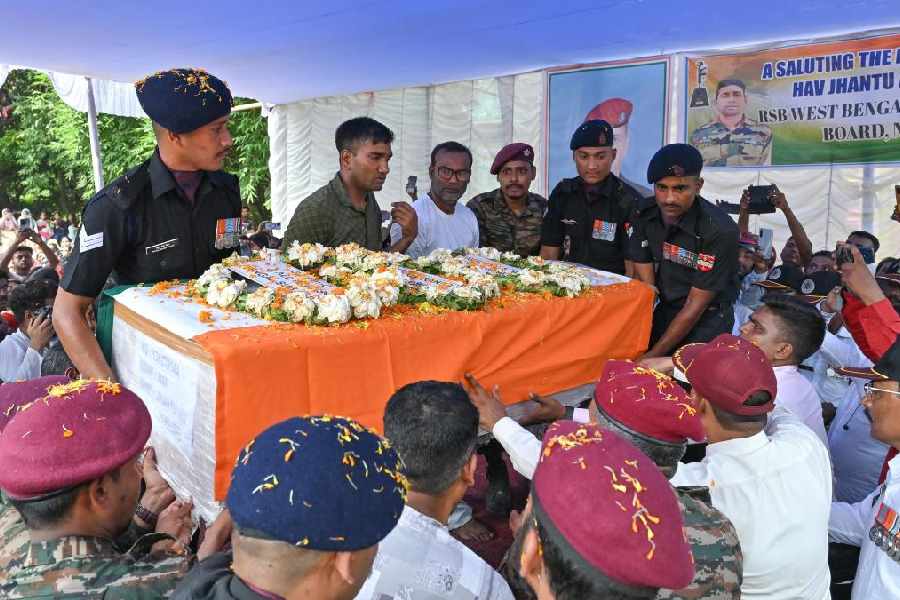Para commando Jhantu Ali Shaikh came home for the last time on Saturday morning, sealed in a coffin that drew thousands to Patharghata near the India-Bangladesh border.
As the coffin draped in the national flag made its way through the narrow village lanes, silence fell over the crowd. Jhantu’s final journey was carried on the shoulders of his elder brother, Subedar Rafiqul Ali Shaikh of the Indian Army, who struggled to hold back his grief.
The 37-year-old commando of 6 Para Special Forces, Jhantu, laid down his life during a counter-insurgency operation in Udhampur, Kashmir. He had sustained injuries while battling terrorists and died before he could be evacuated.
“For Jhantu, duty was like religion,” Rafiqul said quietly. “A soldier belongs to no religion — only to the nation.”
His words struck a chord among the mourners, many of whom raised slogans demanding strong retaliation against the terrorists.
A sea of mourners gathered at Patharghata as Jhantu was laid to rest near his ancestral home. Several thousand people, many with tears streaming down their cheeks, came to pay their final respects to the fallen soldier.
At dawn, villagers lined the lanes of Patharghata as Jhantu’s mortal remains arrived in an army vehicle, escorted by officers. His elder brother, Rafiqul of the army's artillery regiment, walked alongside the coffin, his grief etched in every step.
As the coffin was placed under a makeshift canopy on the local Idgah ground, several thousand people, many in tears, gathered to pay their last respects to the soldier they knew simply as "the boy next door".
Rafiqul, serving the Indian Army for 28 years, struggled to compose himself while laying a floral wreath on his brother’s coffin.
"It is a matter of pride to die on the battlefield," Rafiqul said, his voice breaking.
"But to be killed by terrorists inside our own country is unacceptable. The neighbouring country that sponsors this terrorism must be made to pay."
Speaking to the media, Rafiqul continued: "We want peace. We are soldiers — can anyone tell the religion of a soldier? The Indian Army is made up of Hindus, Muslims, and Sikhs. For us, the nation comes first, family second."
The crowd, deeply moved by Jhantu’s martyrdom, raised demands for a strong retaliatory response against terrorism.
The fallen soldier’s body had arrived at Dumdum airport around 10.30pm on Friday and was taken to the morgue at the Barrackpore Army Base Hospital.
Early on Saturday, after a ceremonial guard of honour, his final journey home began. By 9.25am, the coffin reached Patharghata, where religious rites were performed at his residence, barely 200 meters from the Idgah ground.
After the prayers, the coffin was again brought to the ground where Trinamool Congress MP Mahua Moitra, party leaders Rukbanur Rahaman and Tapas Saha, and CPM leaders Satarup Ghosh and S.M. Sadi joined officials and villagers to pay tribute.
At 12.15pm, Rafiqul, accompanied by three fellow soldiers, lifted Jhantu’s coffin on their shoulders once more, leading the procession to the burial ground.
Jhantu’s wife Sahana, battling tears, added her voice to the demand for justice.
"Terrorists may claim to be Muslim, but they do not respect their faith," she said. "Islam never preaches the killing of innocents. I appeal to the government to act firmly so no more children lose their fathers as mine have."
A mother of a son and daughter, she said she still struggled to accept that her husband would never return home.
Amid the overwhelming grief, many villagers were surprised by the absence of prominent BJP leaders at the funeral.
On Friday, Arjun Biswas, president of the BJP's Nadia North district committee, visited the bereaved family. But on Saturday, no senior BJP figure was present when Jhantu’s body arrived in the village.
Biswas later said: "Our local workers were there. But Mahua Moitra and her team managed everything, which left our workers somewhat discouraged. Besides, the area is minority-dominated, where we have very little organisational strength. A team from our minority wing, led by Charles Nandy, will meet the family on Sunday. Our government will ensure the family receives support."
However, a controversy erupted after an audio clip of a purported phone conversation between Biswas and a BJP worker went viral. In the audio clip, a voice resembling that of Biswas justifies the lack of BJP presence by saying the village did not vote for the party.
Responding to the criticism, BJP MP and spokesperson Shamik Bhattacharya told The Telegraph: "It is true no prominent BJP leader went today, but that does not mean we do not respect the sacrifice of Jhantu Shaikh."











